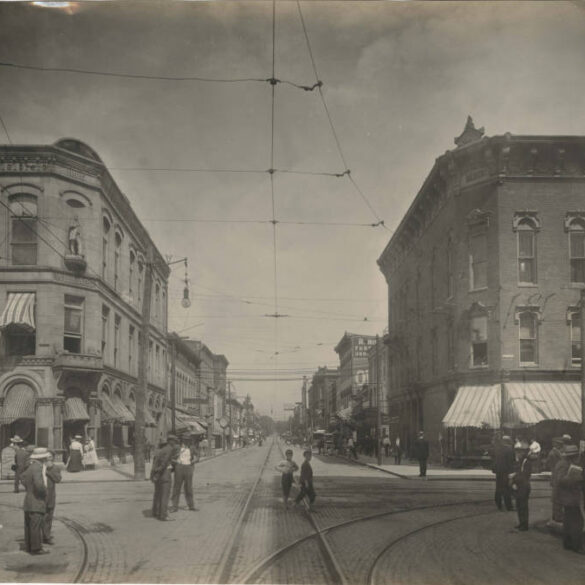From Munsee to Muncietown to Muncie, the stretch of land that makes up Muncie’s part of Delaware County has expanded economically primarily due to the gas boom and manufacturing. With the discovery of natural gas in the county in the 1880s, according to Indiana’s government website, manufacturers like the Ball Brothers capitalized on this with their own Glass Manufacturing Company.
According to Ball State University’s Center for Middletown Studies, manufacturing began to decline in the 1970s, and citizens of Muncie employed in industrialization decreased from 21% to 7%. Today, the number hovers just below 7%.
For fourth-generation Munsonian Andrew Dale, it’s apparent the city has had trouble finding its footing since the massive departure of manufacturing companies. Having spent most of his life in Muncie, Andrew pursued civic interests through his position as Community Development Director for Muncie and as the co-founder and director emeritus of the Schafer Leadership Academy.
“We have an incredibly high amount of poverty in town statistics. I’m on the White Lake Community Council board of directors and leading the fundraising drive for a new community center in a neighborhood just due east,” Andrew says. “The homeownership rate is significantly down compared to the rest of Muncie. We’re hampered with real, pervasive poverty.”
With higher poverty rates comes significantly lower health outcomes, he says. This is a prominent concern for Marcia Freeman, who is pursuing her doctorate in Adult and Community Education at Ball State and is “strongly driven by her drive to help people and her commitment to Muncie.”
Freeman has lived in Muncie all her life, working largely as a business professional; she also pastored and founded a philanthropic organization called the American Association of Payroll Professionals.
For her dissertation, Marcia is researching chronic illness in Muncie relating to barriers to health: large pharmaceutical companies, education, and socioeconomic status. Additionally, she volunteers for the Healthy Lifestyle Center, which provides free services for well-being.
“The thing that pains me the most is the children,” Marcia says. “Obesity, diabetes, and anxiety disorders are off the charts. You’re hard-pressed to talk to anyone these days who doesn’t have some type of anxiety disorder that is diagnosed and real.”
Although the pattern is continued at a national level, Muncie has higher than average chronic illness rates according to the City Health Dashboard.
In considering how to rectify this within our community, Andrew believes that “churches have the greatest untapped potential to get into that space and help alleviate some of those impediments that keep somebody from taking that next step in their wealth development or educational attainments.”
Since churches don’t pay taxes, he sees this as an actionable way to give back; there’s room to “mine that potential,” he says.
“I love those organizations that are the binding forces of good — foundations and churches — in Muncie because I’ve been to a lot of other places, and you don’t find that kind of altruism elsewhere,” Andrew says.
Andrew says his experience in government provides him insight into not only the current management but also strategies for the future. He believes that the city of Muncie must pivot its leadership to value asking hard questions concerning the community.
When Mayor Dan Ridenour submitted a proposal for the 2025 city budget, it was $1.7 million over budget according to Indiana Public Radio. After the finance committee amended the proposal to remove the salary for three positions, it was approved. Ridenour also gave 10% raises to the civilian municipal employees without the city council president’s approval or negotiations required by law.
“I consider that almost malfeasance and I have some serious concerns about how the city’s run,” Andrew says, regarding the money allocation and lack of proper procedure.
Considering the potential areas of improvement for leadership, Andrew finds the severe separation of socioeconomic levels in neighborhoods is to the community’s detriment. This is something that simply requires foresight and planning with the public in mind; “when there’s a housing project, it typically isn’t envisioned by city leaders; it’s envisioned by developers coming to town,” he says.
“If the city developed that plan, they could say, ‘If you want to make a buck’ here, this is where we’ll support you.’ You’re not getting people living next to each other that have different income strata, where they can see the future or appreciate the hardship,” Andrew says.
To meet the primary needs of the community, Andrew feels investing money in projects that need constant upkeep isn’t especially worthwhile; forward-thinking planning is vital for legitimate improvement.
“Our roads are falling apart and it’s evident that we cannot keep up. So, these obligations that we have and this trust compact that we have are just failing,” Andrew says. “That’s my concern. I think the city is its own worst enemy because it’s putting impediments in its way.”
Andrew says a collaborative approach to planning has the potential to not only be fiscally responsible but could generate connections as well. Regardless of what can be done to further support Muncie, he acknowledges the hard work of the city’s residents.
“The majority of Munsonians are living paycheck to paycheck, and they’re industrious. You don’t have to be too industrious when you’re well off, but you should be, right? I’m amazed at the families who are living such a hard, scrappy existence and find a way to make it happen,” Andrew says.
Contact Gabriel Weber via email at grweber@bsu.edu.
Sources: Indiana Public Radio, Indiana General Assembly, City Health Dashboard, U.S. Bureau of Labor Statistics, Ball State University, Indiana State Government




